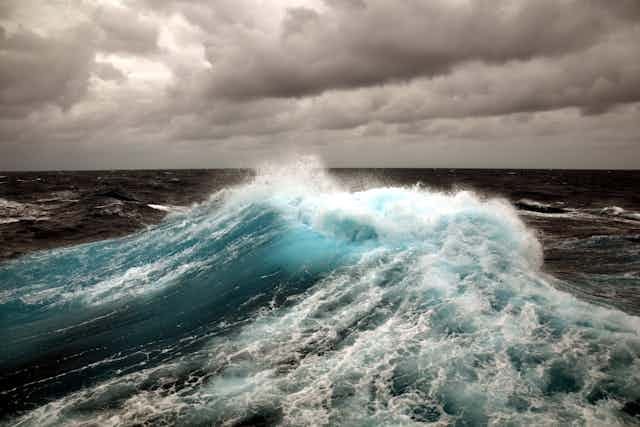Without sufficient oxygen to respire properly, fish experience the same problems as high-altitude mountaineers. Even relatively small oxygen deficits mean they become sluggish, their reproduction is affected and their growth is stunted.
That’s one reason an oxygen deficit deep in the oceans is a problem – and climate change is making it worse.
But we have recently published research in Nature Communications which shows how storms interact with the tide in summer to play an important role in churning up the oceans and “mixing down” oxygen. This mixing helps maintain healthy conditions in deeper coastal seas around the UK and elsewhere.
This is important because creatures in the ocean are reliant on oxygen to survive in the same way as animals on land are. But it’s harder work underwater: fish expend tens of times more energy to breathe oxygen than we do, with bigger fish having to expend even more effort.
The warming of the oceans is making the problem worse as not only does warmer water hold less oxygen, but warmer fish need more oxygen. Large deep water dwelling fish such as cod and haddock are particularly affected.
Why deep oceans are losing their oxygen
As you go deeper into the ocean, dissolved oxygen is used up as sinking organic matter rots and decomposes (a process that requires oxygen). In spring, the ocean can form layers which don’t mix very much. This isolates the deep water from the atmosphere, a main source of oxygen. This isolation coupled with the decomposition of sunken organic matter depletes the store of dissolved oxygen, leading to deep-water deoxygenation.

As the climate warms, things may get worse. Not only does warmer water hold less oxygen, but the periods of deep-water isolation will also lengthen. The strength of stratification is also predicted to increase, creating a greater barrier preventing oxygen from mixing down into the deep water. The combination of these impacts is predicted to significantly increase summer deep-water deoxygenation.
Our new research shows that the mixing down of oxygen plays slows the rate of the deep-water oxygen deficit by around half.
During the period of stratification, a combination of summer storms and tides interact to mediate the deepwater oxygen deficit. The tides act to stir up deep water nutrients, which promote the growth of microscopic plants known as phytoplankton. These phytoplankton produce oxygen, some of which is then mixed down into the deep water.
While our new research highlights the importance of mixing in mediating deepwater oxygen levels, more work is needed to assess the impact of warming seas on mixing. Furthermore, we still don’t fully understand the impact on oxygen levels of heatwaves, such those experienced in the stratified seas around the UK in June 2023.

These new results also have important implications for the proposed mass development of floating wind farms in seasonally stratified seas, including the Celtic Sea and northern North Sea. The presence of these wind farms, typically with large ballasts, counterweights and cables below the surface, will help mix the ocean waters.
This will promote phytoplankton growth and the potential to mix oxygen between surface and deep waters over the summer. Our new research highlights the need for ocean mixing to be considered in the design of turbine foundations and in the planning of new wind farms.

Don’t have time to read about climate change as much as you’d like?
Get a weekly roundup in your inbox instead. Every Wednesday, The Conversation’s environment editor writes Imagine, a short email that goes a little deeper into just one climate issue. Join the 30,000+ readers who’ve subscribed so far.

